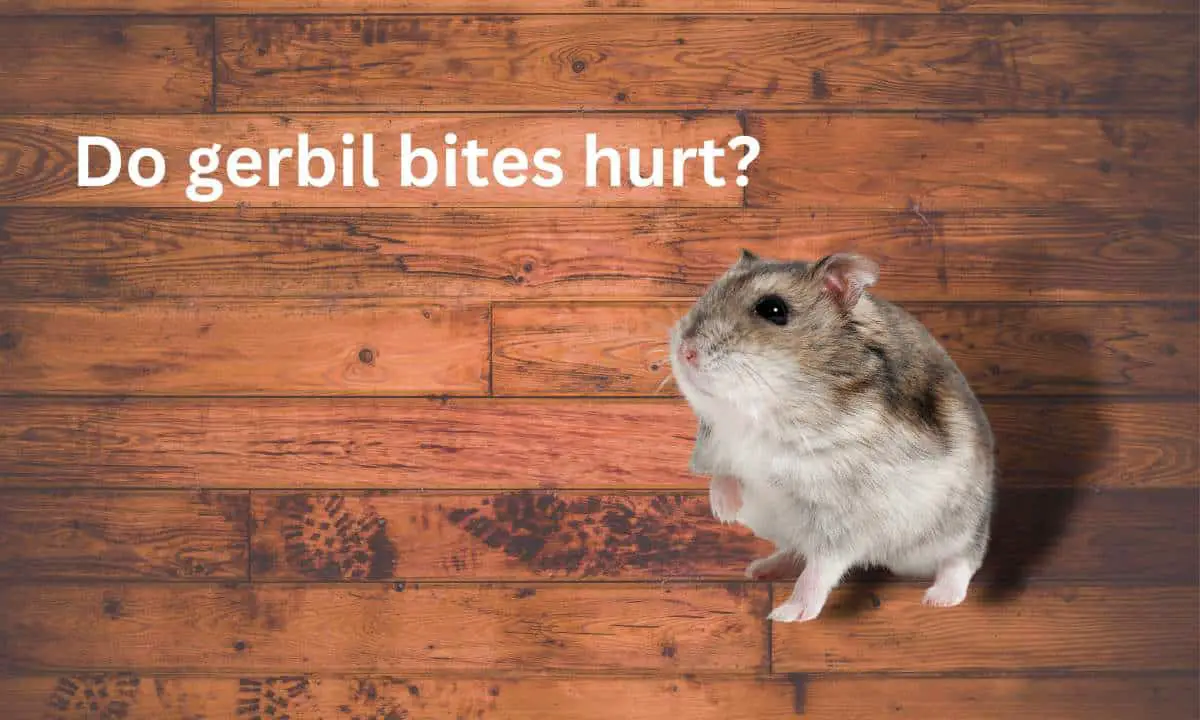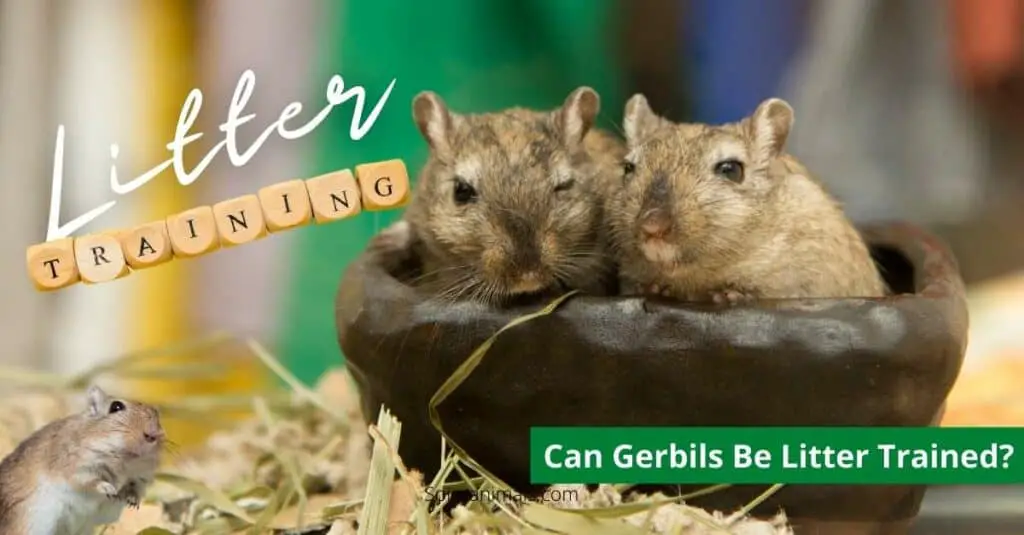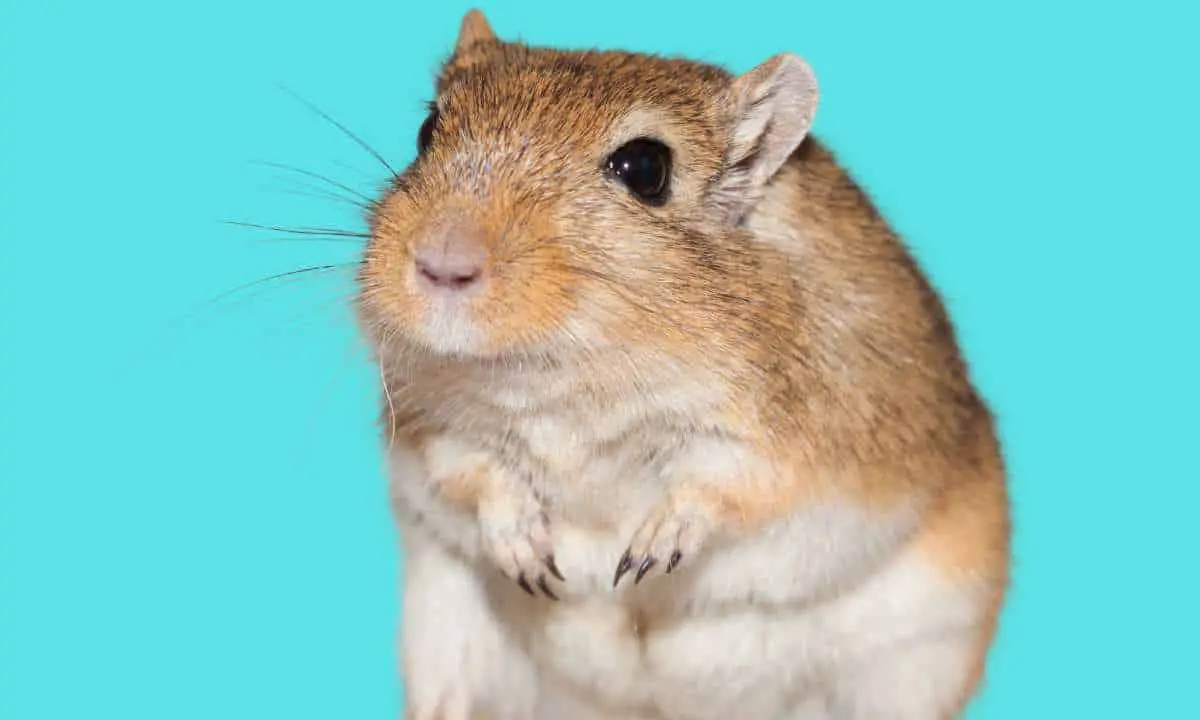Gerbils are cute, cuddly creatures that make great pets. But what happens if they bite you?
A gerbil’s small size and seemingly harmless nature can be deceiving.
while gerbil bites themselves aren’t dangerous, they can cause an infection if bacteria enter the wound and you don’t clean it properly.
Knowing how to handle a gerbil bite can help keep you safe and healthy.
Table of Contents
Do Gerbil Bites Hurt?
Gerbil bites can range from a mild pinch to a more serious wound, depending on the size, age, and temperament of the gerbil.
Generally speaking, gerbils are friendly animals that won’t resort to biting unless they feel threatened and have no way out. A gerbil might give you a little nip but it shouldn’t be too painful.
However, some people may experience more severe pain from a gerbil bite. The bite itself may cause pain, swelling, bleeding, or itching.
In rare cases, an infection may develop if bacteria enter the wound and it isn’t properly cleaned.
If you do get bitten by your gerbil, there are some steps you can take to manage the pain or discomfort.
Applying ice to the area can help reduce swelling and inflammation. Painkillers such as ibuprofen or paracetamol can also help with any pain associated with the bite.
If there is an infection present, topical creams or antibiotics may be necessary in order to treat it properly.
In conclusion, gerbil bites can range from mild to severe depending on various factors such as the size and temperament of the animal.
If you do get bitten by your gerbil, applying ice and taking painkillers can help reduce any discomfort associated with it.
In rare cases where an infection develops, topical creams or antibiotics may be necessary for proper treatment.

Can Gerbil Bites Be Dangerous?
Gerbil bites may not seem like a big deal, but they can actually be quite dangerous. Gerbils carry bacteria that can enter the wound and cause an infection if it is not properly cleaned.
The most common complications of gerbil bites are infections, abscesses, and cellulitis.
It is important to wash the wound thoroughly with soap and water as soon as possible after the bite occurs. It is also important to avoid touching the wound with unclean hands or objects.
If you notice any signs of infection such as redness, warmth, fever, or pus coming from the wound, seek medical attention right away.
If the wound is deep or bleeding heavily, you should also seek medical attention immediately.
Can You Get a Disease from a Gerbil Bite?
The answer is yes. Gerbils can carry many bacteria that can cause infections if they enter an open wound.
The most common of these infections is rat-bite fever, which is caused by bacteria such as Streptobacillus moniliformis and Spirillum minus.
The signs and symptoms of rat-bite fever include fever, rash, joint pain, or headache.
If left untreated, the infection can spread to other parts of the body and become life-threatening. Diagnosis is typically made through blood tests or cultures from the infected area.
Treatment usually involves antibiotics and supportive care such as fluids and rest.
In order to prevent rat-bite fever and other gerbil-related infections, it’s important to take certain precautions when handling gerbils.
This includes washing your hands regularly after contact with the gerbil or its cage, avoiding close contact with sick gerbils, and wearing gloves or protective gear when handling them.
It’s also important to keep the gerbil’s cage clean to reduce the risk of infection spreading between animals.
Overall, it’s important to be aware that gerbils can carry bacteria that can cause serious infections if they enter an open wound.
Taking proper precautions when handling them is key to preventing these diseases from spreading.
Do I Need a Tetanus Shot for a Gerbil Bite?
If you have been bitten by a gerbil, it is important to consider whether or not you need a tetanus shot.
Tetanus is an infection caused by the bacterium Clostridium tetani, and it can be life-threatening if left untreated. The bacteria can enter the body through cuts, scratches, and even animal bites.
The Centers for Disease Control and Prevention (CDC) recommends that all individuals receive routine vaccinations against tetanus throughout their lifetime.
Vaccination guidelines vary depending on age and medical conditions, so it is important to consult with your doctor to determine what type of vaccination is best for you.
In general, if the wound from the gerbil bite is deep or contaminated with dirt or saliva, then it may be necessary to get a tetanus shot as soon as possible.
If you have not received a tetanus vaccine in the last 10 years, then you should also get vaccinated as soon as possible.
Tetanus infection can cause severe muscle spasms and lockjaw, which can lead to difficulty breathing and swallowing.
It can also cause fever and sweating. If left untreated, it can be fatal in some cases.
Therefore, it is important to seek medical attention immediately after being bitten by a gerbil in order to assess whether or not a tetanus shot is necessary.
Is It Bad If a Gerbil Bites You?
Gerbils are small, vulnerable animals that can be easily scared by their owners. Fear or anxiety towards gerbils can have long-term consequences, such as avoiding interactions or neglecting their care.
It is important to address fear or anxiety toward gerbils in order to maintain a healthy relationship with them.
There are several strategies for addressing fear or anxiety toward gerbils, such as gradual exposure, desensitization, and seeking professional help.
Gradual exposure involves gradually increasing the amount of time spent around the gerbil until they become comfortable with your presence.
Desensitization involves introducing the gerbil to a variety of stimuli that may cause fear or anxiety in a safe and controlled environment.
Seeking professional help from an animal behaviorist can also be beneficial in addressing fear or anxiety toward gerbils.
Positive reinforcement, socialization, and regular care are also important for maintaining a healthy relationship with gerbils.
Positive reinforcement involves rewarding desired behaviors with treats or verbal praise in order to encourage them to repeat those behaviors.
Socialization involves exposing the gerbil to different people and environments so that they become more comfortable interacting with others.
Regular care includes providing adequate food, water, shelter, and exercise for your pet gerbil in order to ensure its health and well-being.
Why Does My Gerbil Bite Me?
Gerbils are generally friendly and docile animals, but they can sometimes bite when they feel threatened or uncomfortable.
It’s important to understand why your gerbil might be biting you and how you can reduce the likelihood of it happening again.
There are several common reasons why gerbils bite.
- Fear is a major factor, as gerbils may bite if they feel scared or threatened.
- Territoriality is another common reason, as gerbils may bite if they feel their space is being invaded.
- Stress and discomfort can also lead to biting, as gerbils may become aggressive if they don’t have adequate housing, nutrition, or enrichment.
It’s important to recognize the signs of aggression or discomfort in your gerbil before it bites you.
Common signs include hissing, tail flicking, and nipping at your hand. If you notice any of these signs, it’s important to take steps to reduce your gerbil’s stress or discomfort right away.
Fortunately, there are several strategies for reducing aggression or discomfort in your gerbil. Providing appropriate housing with plenty of space for them to explore and play is essential for keeping them happy and healthy.
Ensuring that they have access to a balanced diet with plenty of fresh vegetables will help keep them well-nourished and energized. Offering enrichment activities such as tunnels and tubes will give them something fun to do throughout the day.
If these strategies don’t seem to be working, it’s best to seek professional advice from an experienced veterinarian or animal behaviorist who can provide more tailored advice for your pet’s specific needs.
How to Care for a Gerbil Bite
When a gerbil bites, it’s important to take the proper steps to care for the wound. To start, it’s essential to clean the wound thoroughly with either soap and water or an antiseptic solution.
This will help reduce the risk of bacteria entering the wound and causing an infection. After cleaning, make sure to keep the wound dry and covered with a sterile bandage.
It’s also important to monitor the wound for signs of infection such as redness, swelling, or discharge. If any of these symptoms occur, it may be necessary to remove the bandage and seek medical attention.
By following these steps, you can help ensure that your gerbil bite heals properly and without complications.
How You Can Prevent Gerbil Bites Or Scratches
Gerbils are friendly and curious animals, but they can still bite or scratch if they feel threatened. To prevent gerbil bites or scratches, there are a few strategies you should consider.
When introducing gerbils to new environments or handling techniques, it is important to use positive reinforcement and gradual acclimation.
This will help your gerbil become more comfortable with their surroundings and reduce the likelihood of them feeling scared or threatened.
Providing appropriate housing, nutrition, and enrichment for your gerbil is essential in reducing stress and aggression.
When interacting with gerbils, it is important to be gentle and patient. It is also important to avoid sudden movements that could startle them. If you need to pick up your gerbil, make sure to do so slowly and carefully using both hands.
You should also avoid putting your fingers near their face as this could trigger an aggressive response from them.
Finally, it is important to provide plenty of enrichment activities for your gerbils such as chew toys or tunnels that they can explore safely.
This will help keep them entertained while also reducing any stress or anxiety they may have about their environment.
By following these strategies, you can help ensure that your gerbil remains safe and happy in its environment while avoiding any potential bites or scratches.
Conclusion:
Gerbil bites can be a serious issue if not handled properly.
It is important to be aware of the potential risks associated with gerbil bites and take the necessary precautions to ensure the safety of both you and your pet.
Gerbils are generally friendly animals, but if they feel threatened, they may resort to biting as a form of defense. If you do get bitten, it is important to clean the wound immediately and seek medical attention if necessary.
By understanding the implications of gerbil bites and taking proper precautions when handling them, you can help prevent future incidents from occurring.



